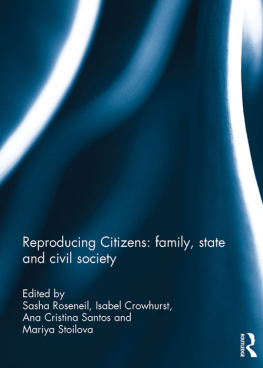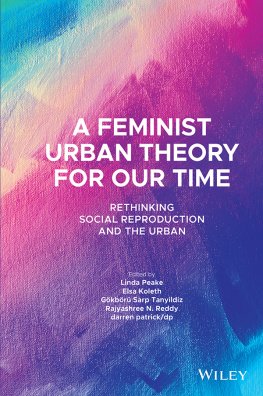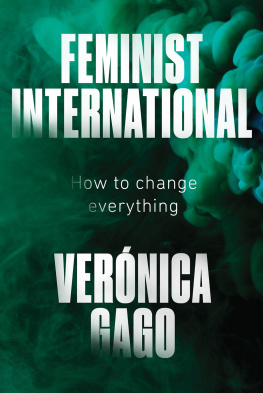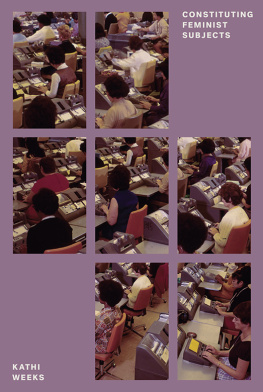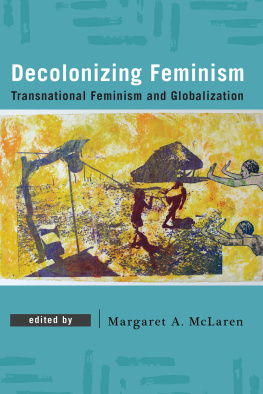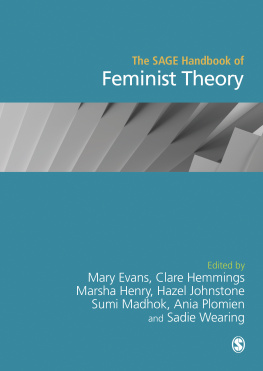Reproducing the World
Essays in Feminist Theory
Feminist Theory and Politics
Virginia Held and Alison Jaggar, Series Editors
TITLES IN THIS SERIES
Reproducing the World: Essays in Feminist Theory, Mary O'Brien
Rocking the Ship of State: Toward a Feminist Peace Politics, edited by Adrienne Harris and Ynestra King
Sexual Democracy: Women, Oppression, and Revolution, Ann Ferguson
Reproducing the World
Essays in Feminist Theory
Mary OBrien
First published 1989 by Westview Press, Inc.
Published 2019 by Routledge
52 Vanderbilt Avenue, New York, NY 10017
2 Park Square, Milton Park, Abingdon, Oxon OX14 4RN
Routledge is an imprint of the Taylor & Francis Group, an informa business
Copyright 1989 Taylor & Francis
All rights reserved. No part of this book may be reprinted or reproduced or utilised in any form or by any electronic, mechanical, or other means, now known or hereafter invented, including photocopying and recording, or in any information storage or retrieval system, without permission in writing from the publishers.
Notice:
Product or corporate names may be trademarks or registered trademarks, and are used only for identification and explanation without intent to infringe.
Library of Congress Cataloging-in-Publication Data
OBrien, Mary, 1926
Reproducing the world / by Mary OBrien.
p. cm.(Feminist theory and politics)
ISBN 0-8133-0761-9. ISBN 0-8133-0760-0 (if published in paperback)
1. Feminism. 2. Patriarchy. 3. Reproduction. I. Title.
II. Series.
HQ1154.027 1989
305.4'2dc 19 88-10679
CIP
ISBN 13: 978-0-367-28571-5 (hbk)
To
Somer Brodribb,
who has gracefully turned this material
from chaos to order,
and for
Cath McNaughton,
without whose support I would never
be able to deliver
The publication of papers and lectures of the kind offered here is both an honor and a somewhat alarming invitation to self-criticism. Most feminists are united in the devotion to the theory of "collectivity," to the need for radical equity among feminists. At the same time, structural constraints nourish the male concept of "leadership" and "distinction" in a way that results in a sort of star system, nourished by mass-produced food at putative banquets and recycled feminist polemic entombed in the unrewarding format of the "conference paper." There is a lot of that stuff in my files, and the challenge to reproduce it textually tends to bring on a deep yearning to deconstruct the lot. However, the methodologies of deconstruction remain frozen in the dying languages of European patriarchy, despite the efforts of French women scholars to revitalize them. Further, the tendency of many feminists to worry about the ossification of the movement in the academy is largely a product of the class divisions in both liberal and socialist polities. In practice, the movement is active in many areas where both literacy and theorizing yield to the urgency of the lived experience of women's oppression in diverse cultural contexts.
Perhaps the greatest challenge to feminist politics is the need to reject those varied historical practices and imperialist yearnings which power patriarchal political and cultural machines. Yet I would argue that such a development has to be informed by theory, and the need to provide space and time for theorizing is urgent and most clearly available in the academy; though even there the price in personal fatigue is high. Whether or not the public lecture qualifies for inclusion in "practice," however, is a point on which there is no clear agreement: Socratic circles may extend their circumferences, but they remain circles. What we need is popular fiction, feminist comic books, day-care strategies which stress context rather than location, and a million other innovative political and social activities. Still, the significance of academic feminism may be over-stated. E. M. Forster, in A Passage to India, commented that squirrels might be in tune with the universe but are intelligible only to other squirrels, which might serve as a definition of the limits of elitism.
One aspect of the work that follows which does abate a preoccupation with heavy theorizing is the variety of audiences to whom these essays are addressed. Feminist academic careers do tend to a greater variety than conventional male ones, though there is a danger that as the movement expands it will also contract: the existence of "academic Marxism" is a fine cautionary tale. Many older feminists, like myself, came late to the academy, and this book reflects that more eclectic background. My twenty-odd years in midwifery and nursing are reflected here, as is my long and active association with British socialism. Furthermore, the fact that my academic career has developed in an institute for the study of education and that a large number of my students are teachers has also pushed me in certain directions: to questions of curriculum, for example, and to studies of the work of Gramsci which has informed the development of "hegemony theory." To be sure, there are many feminists who believe that patriarchal history and politics are infinitely barren, but I have found that the challenge of critique of patriarchal ideology is a spur to creative theorizing. I have therefore included in the collection some critical work in this area which was essential to the development of reproductive theory, which has been my major preoccupation.
Events, too, challenge theoretical creativity. When I wrote The Politics of Reproduction in the late 1970s, my analysis of what I was doing and why I was doing it then came from a personal observation that women's sexual and reproductive decisions were beginning to transcend the boxes which had encased them for centuries and that this had to be a "world historical event." This Hegelian/Marxist phrase I chose to interpret in a materialist way. World historical events must have a basis in some transformation of the "material conditions" of human life. The rather puny candidate I offered as fulfilling this condition was "the pill," noting that the ability of women to control their fertility was a very radical innovation. Frankly, I had no idea that the development of reproductive technology would be so radical or so swift, that the practice would outpace both the theorizing and the social changes which this revolution would initiate. Louise Brown was born in England while The Politics of Reproduction was accumulating rejection slips from patriarchal publishers, and without the pugnacious advocacy of Dale Spender, the book would never have seen the light of day. Now, of course, the problems of the development of this technology and the transformation of the social construction or human sexuality and reproductive power which accompanies it are central to feminist politics. The move, in a single decade, from the contraceptive pill and the "test-tube baby" to surrogate mothering and multiple birthing is one which creates an enormous challenge to women, not least in the fact that the liberation from compulsory childbearing has not broken masculine control of women's fertility. It may have enhanced it, and it has certainly sped up the process of industrializing it and confirming legal and medical-that is, conservative-male control, to say nothing of the bonus for capitalist accumulation in a giddy increment to the reproduction of production. Resistance to self-administered artificial insemination and "free-standing" abortion clinics are resistances to low-tech procedures which women can to some extent control.





